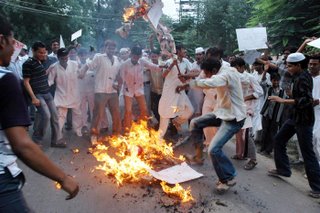Pope Benedict, Emperor Manuel II Palaeologus, & Mohammed

Muslims burned Pope Benedict XVI in effigy in Srinagar, India and other parts of the world in protest over part of a speech he made in Germany at the University of Regensburg on Tuesday, September 12th. In his speech, Pope Benedict XVI referred to a conversation between the “Byzantine emperor Manuel II Paleologus and an educated Persian on the subject of Christianity and Islam, and the truth of both.”
It seems that the dialogue between the two learned men dealt with the structures of faith contained in the Bible and in the Qur'an, and dealt especially with the image of God and of man, “while necessarily returning repeatedly to the relationship between - as they were called - three "Laws" or "rules of life": the Old Testament, the New Testament and the Qur'an.” The Pope went on to say that it was not his intention to discuss this question in his speech. He said that he wanted to address one point, which he described as “marginal to the dialogue as a whole.”
Pope Benedict referred to a conversation edited by Professor Theodore Khoury, where the Emperor Manuel II Palaeologus addressed the concept of holy war. The Pope felt that “The emperor must have known that surah 2, 256 reads: ‘There is no compulsion in religion’”, and that this surah is from the early period of Mohammed’s writings when he was without power. The Emperor was also familiar with surahs that were written later, dealing with holy war.
Emperor Manuel II Palaeologus then addressed the central question regarding the relationship between religion and violence in general. He said; "Show me just what Mohammed brought that was new, and there you will find things only evil and inhuman, such as his command to spread by the sword the faith he preached”. The Emperor then clarified this charge by explaining that spreading the faith through violence is unreasonable, that violence is incompatible with the nature of God and the nature of the soul.
Emperor Manuel II Palaeologus went on to say; "God is not pleased by blood - and not acting reasonably is contrary to God's nature. Faith is born of the soul, not the body. Whoever would lead someone to faith needs the ability to speak well and to reason properly, without violence and threats... To convince a reasonable soul, one does not need a strong arm, or weapons of any kind, or any other means of threatening a person with death..."
Pope Benedict went on to tell his audience; “The decisive statement in this argument against violent conversion is this: not to act in accordance with reason is contrary to God's nature.” The Pope further explained that; “The editor, Theodore Khoury, observes: For the emperor, as a Byzantine shaped by Greek philosophy, this statement is self-evident. But for Muslim teaching, God is absolutely transcendent. His will is not bound up with any of our categories, even that of rationality. Here Khoury quotes a work of the noted French Islamist R. Arnaldez, who points out that Ibn Hazn went so far as to state that God is not bound even by his own word, and that nothing would oblige him to reveal the truth to us. Were it God's will, we would even have to practise idolatry.
So, you have the Pope speaking about a dialogue between two men in1391, both of whom I assume were well educated and well spoken. He simply quoted an Emperor who offered his own theological view of what is and isn’t acceptable to God.
In fact, in the Pope’s conclusion to his speech he said; “The intention here is not one of retrenchment or negative criticism, but of broadening our concept of reason and its application.”
It seems that Muslims around the world have taken exception to the Emperor’s point of view, and are holding the Pope responsible. And as a result, you have Muslims calling for Pope Benedict’s head. Literally.
Muslim reaction to the speech and their behavior at these protests just adds credence to the Emperor’s statement.



0 Comments:
Post a Comment
<< Home